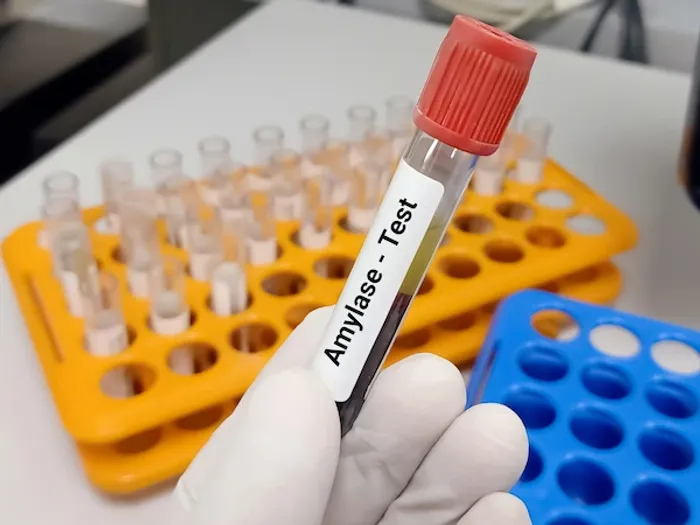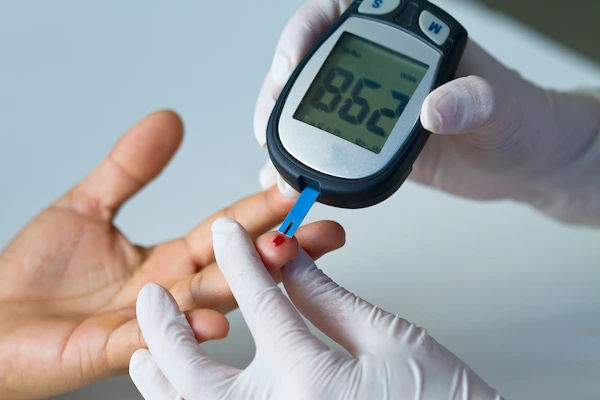Serum Amylase Normal Range Explained
All about serum amylase, range, causes, symptoms, when to get it done and management of normal range.

Written by Dr. Rohinipriyanka Pondugula
Reviewed by Dr. Mohammed Kamran MBBS, FIDM
Last updated on 8th Aug, 2025

Introduction
If you’ve ever had a blood test and noticed the term serum amylase in your report, you might wonder what it means and why it matters. Understanding your serum amylase levels can help you and your doctor assess your pancreatic and digestive health. In this article, we’ll explain what serum amylase is, its normal range, what abnormal levels could indicate, and how to manage them.
What is Serum Amylase?
Amylase is an enzyme produced mainly by the pancreas and salivary glands. Its primary role is to help break down carbohydrates (like starch and sugars) into simpler sugars for digestion.
When doctors measure serum amylase, they check the level of this enzyme in your blood. Abnormal levels—either too high or too low—can signal potential health issues, particularly related to the pancreas.
What is the Normal Range for Serum Amylase?
The normal range for serum amylase can vary slightly between labs, but generally, it falls within:
Adults: 30–110 U/L (units per litre)
Children: Slightly lower than adults
If your test results are outside this range, your doctor may investigate further to determine the cause.
Consult a Gastroenterologist for a healthy pancreas and overall health.
What Causes High Serum Amylase Levels?
Elevated amylase levels (hyperamylasemia) often indicate:
1. Acute Pancreatitis – A sudden inflammation of the pancreas, usually due to gallstones or excessive alcohol consumption.
2. Chronic Pancreatitis – Long-term pancreas inflammation, often linked to alcohol abuse or genetic factors.
3. Gallbladder Issues – Gallstones or infections can block pancreatic ducts, increasing amylase.
4. Salivary Gland Disorders – Infections (like mumps) or tumours can raise amylase.
5. Kidney Disease – Since the kidneys filter amylase, impaired kidney function can lead to higher levels.
6. Digestive Disorders – Conditions like intestinal obstruction or peptic ulcers may also affect amylase.
Get Your Health Assessed
Symptoms of High Amylase Levels
If your amylase is elevated due to pancreatitis or other conditions, you may experience:
- Severe upper abdominal pain (radiating to the back)
- Nausea and vomiting
- Fever
- Swollen or tender abdomen
- Loss of appetite
What Causes Low Serum Amylase Levels?
Low amylase levels (hypoamylasemia) are less common but may occur due to:
1. Chronic Pancreatitis (Late Stage) – Over time, the pancreas may produce less amylase.
2. Liver Disease – Severe liver damage can affect enzyme production.
3. Cystic Fibrosis – A genetic disorder affecting the pancreas.
4. Malnutrition – Severe protein deficiency can lower enzyme levels.
Symptoms of Low Amylase Levels
Since low amylase is often linked to chronic conditions, symptoms may include:
- Poor digestion (bloating, diarrhoea, fatty stools)
- Weight loss
- Fatigue
When Should You Get Tested?
Your doctor may recommend a serum amylase test if you have:
- Unexplained abdominal pain
- Symptoms of pancreatitis
- A history of alcohol abuse or gallstones
- Digestive issues like chronic diarrhoea
Sometimes, amylase is checked along with lipase (another pancreatic enzyme) for a clearer diagnosis.
How to Manage Abnormal Amylase Levels?
If your amylase levels are abnormal, your doctor will determine the underlying cause and suggest treatment. However, you can support your pancreatic and digestive health with these lifestyle tips:
1. Eat a Pancreas-Friendly Diet
- Avoid alcohol (a major cause of pancreatitis).
- Limit fatty and fried foods to reduce the pancreas workload.
- Eat small, frequent meals to aid digestion.
- Stay hydrated to help the enzyme function.
2. Manage Underlying Conditions
- If you have gallstones, follow your doctor’s advice (surgery may be needed).
- If diabetes is a factor, monitor blood sugar levels.
- Quit smoking, as it worsens pancreatic health.
3. Monitor Symptoms
If you experience severe abdominal pain, seek medical help immediately.
Follow up with your doctor for repeat tests if needed.
When to See a Doctor?
If you have persistent digestive issues or unexplained abdominal pain, consult a healthcare provider. Early diagnosis of pancreatic or digestive disorders can prevent complications.
Final Thoughts
Serum amylase is a simple but important blood test that helps assess pancreatic and digestive health. While abnormal levels don’t always mean a serious problem, they should never be ignored. By understanding your results and working with your doctor, you can take steps to maintain a healthy pancreas and overall well-being.
Consult a Gastroenterologist for healthy pancreas and overall health.
Consult a Gastroenterologist for healthy pancreas and overall health.

Dr Rohit Sureka
Gastroenterology/gi Medicine Specialist
15 Years • MBBS, DNB General Medicine, DNB Gastroenterology
Jaipur
Apollo 247 virtual - Rajasthan, Jaipur
Dr. Vijay Rai
Gastroenterology/gi Medicine Specialist
19 Years • MBBS,MD General Medicine,MD GASTROENTOLOGY
Kolkata
Livgastro, Kolkata

Dr. Paramesh K N
Gastroenterology/gi Medicine Specialist
16 Years • MBBS, MS ( General Surgery), DNB ( Surgical Gastroenterology)
Hyderabad
Sprint Diagnostics Centre, Hyderabad
Dr. Sultan Nawahirsha
Gastroenterology/gi Medicine Specialist
1 Years • MBBS, MD ( MEDICINE), DM (MED, GASTROENTEROLOGY)
Chennai
MGM HEALTH CARE, Chennai

Dr. Harsh Gupta
Gastroenterology/gi Medicine Specialist
14 Years • MBBS, MD General Medicine, DM - Gastroenterology
Jaipur
GUPTA GASTROCARE, Jaipur
Consult a Gastroenterologist for a healthy pancreas and overall health.

Dr Rohit Sureka
Gastroenterology/gi Medicine Specialist
15 Years • MBBS, DNB General Medicine, DNB Gastroenterology
Jaipur
Apollo 247 virtual - Rajasthan, Jaipur
Dr. Vijay Rai
Gastroenterology/gi Medicine Specialist
19 Years • MBBS,MD General Medicine,MD GASTROENTOLOGY
Kolkata
Livgastro, Kolkata

Dr. Paramesh K N
Gastroenterology/gi Medicine Specialist
16 Years • MBBS, MS ( General Surgery), DNB ( Surgical Gastroenterology)
Hyderabad
Sprint Diagnostics Centre, Hyderabad
Dr. Sultan Nawahirsha
Gastroenterology/gi Medicine Specialist
1 Years • MBBS, MD ( MEDICINE), DM (MED, GASTROENTEROLOGY)
Chennai
MGM HEALTH CARE, Chennai

Dr. Harsh Gupta
Gastroenterology/gi Medicine Specialist
14 Years • MBBS, MD General Medicine, DM - Gastroenterology
Jaipur
GUPTA GASTROCARE, Jaipur
Get Your Health Assessed
₹530(₹1325)60% off

